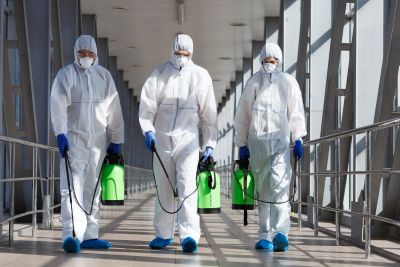Texas Biomedical Research Institute (Texas Biomed) received two Department of Defense (DoD)'s Defense Health Agency subcontracts to assess the efficacy of surface coating and aerosolized decontamination technologies to combat SARS-CoV-2 and other respiratory pathogens on surfaces and in the air.
The $4.6 million contracts, of which Texas Biomed will receive $1.95 million, are aimed at identifying viral and microbial decontamination strategies that improve indoor air quality and surfaces in medical treatment facilities, close quarters and rigorous settings where material cannot be disinfected regularly, as seen in many combat areas. Amber Mallory, PhD, director of trauma and clinical care research for the 59th Medical Wing Science and Technology Office and Texas Biomed professors Luis Martinez-Sobrido, PhD, and Jordi B. Torrelles, PhD, are leading these efforts.
The first study will analyze the effectiveness of treating multiple surface types with a zeolite coating, specially formulated by ZeovationÓ. Zeolite is a naturally occurring mineral that is widely produced commercially for its antimicrobial properties. This study aims to determine whether various surfaces treated with a zeolite coating can produce non-toxic, long-lasting, self-renewing decontamination properties against SARS-CoV-2, as well as flu, mold and bacteria. While there are products on the market that decontaminate surfaces, one limitation is the weakening of effectiveness over time requiring reapplication.
“We aim to look at how fast the coating works, meaning how soon after coating a surface will it display antimicrobial properties,” explained Mallory. “We want to also look at how long the antimicrobial properties last on each surface, and of course, what microbes it works against.”
The study will test at least a dozen materials ranging from cotton and synthetics to metals and plastics and will look at duration of exposure from hours to days. The researchers also aim to study various application strategies including painted coating versus a spray coating to determine if method of application impacts effectiveness.
Martinez-Sobrido and Torrelles will be performing these studies in vitro, testing multiple materials inside Texas Biomed’s state-of-the-art Biosafety Level 3 (BSL3) facilities. The goal is to determine if zeolite coating can prevent spreading of respiratory infections such as SARS-CoV-2 by preventing transmission through contaminated surfaces.
This first study will be combined with a second study (aerosol) to also determine whether the production of non-toxic low levels of hydrogen peroxide being circulated through the air can sanitize air (e.g. destroy airborne pathogens) as it is being expelled, so as people breath, talk, cough, etc. the air around them would be continuously disinfected, improving indoor air quality.
Martinez-Sobrido notes that, “Very low levels of hydrogen peroxide are safe to breathe, so we are testing whether significantly low levels of hydrogen peroxide gas, even lower than OSHA standards, can be pumped into contained spaces and inactivate microbes in an effort to reduce respiratory pathogens transmission, including SARS-CoV-2, through the air.” This technology originated in mold remediation, and while there are multiple systems on the market that provide this equipment, none have been tested against SARS-CoV-2 yet.
This two-part study will include in vitro studies tested by the Department of Defense and in vivo (animal model) studies at Texas Biomed in their Animal Biosafety Level 2 and 3 laboratories using multiple respiratory pathogens, including SARS-CoV-2.
“These technologies could greatly impact defense readiness by providing proactive solutions for our military personnel who often operate in close quarters,” Mallory stated. “Finding technologies that can be repurposed against SARS-CoV-2 and other respiratory pathogens for environments that our men and women in the armed forces find themselves in daily is critical to ensuring defensive readiness. And, these technologies will have applications for civilian populations, as well.”
“We are excited to learn whether these technologies, designed for other purposes, can play a crucial role in disinfecting spaces where people gather – places like ERs, dormitories, classrooms and more,” Torrelles said. “Ending this COVID-19 pandemic will require strategies for treating and vaccinating patients, but technologies that stop transmission prior to infection are also critical.”
Source: Texas Biomedical Research Institute

Be the first to comment on "Texas Biomed Scientists Partner with DoD to Test Decontamination Technologies Against SARS-CoV-2"